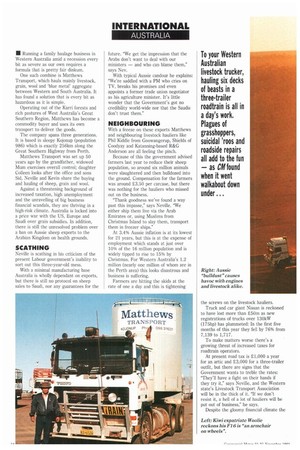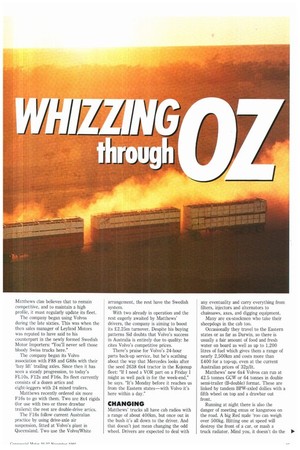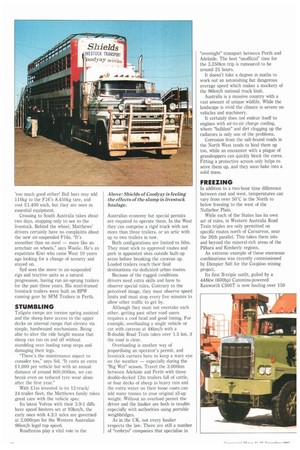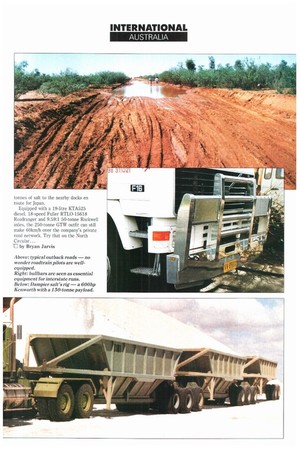INTERNATIONAL
Page 36

Page 37

Page 38

Page 39

If you've noticed an error in this article please click here to report it so we can fix it.
AUST1ALIA
• Running a family haulage business in Western Australia amid a recession every bit as severe as our own requires a formula that is pretty fair dinkum.
One such combine is Matthews Transport, which hauls mainly livestock, grain, wool and 'blue metal' aggregate between Western and South Australia. It has found a solution that is every bit as hazardous as it is simple.
Operating out of the Karri forests and rich pastures of West Australia's Great Southern Region, Matthews has become a commodity buyer and uses its own transport to deliver the goods.
The company spans three generations. It is based in sleepy Kojonup (population 986) which is exactly 256km along the Great Southern Highway from Perth.
Matthews Transport was set up 50 years ago by the grandfather, widowed Mum exercises overall control; daughter Colleen looks after the office and sons Sid, Neville and Kevin share the buying and hauling of sheep, grain and wool.
Against a threatening background of increased taxation, high unemployment and the unravelling of big business financial scandals, they are thriving in a high-risk climate. Australia is locked into a price war with the US, Europe and Saudi over grain subsidies. In addition, there is still the unresolved problem over a ban on Aussie sheep exports to the Arabian Kingdom on health grounds.
Neville is scathing in his criticism of the present Labour government's inability to sort out this three-year-old mess.
With a minimal manufacturing base Australia is wholly dependant on exports, but there is still no protocol on sheep sales to Saudi, nor any guarantees for the future. "We get the impression that the Arabs don't want to deal with our ministers — and who can blame them," says Nev.
With typical Aussie candour he explains: "We're saddled with a PM who cries on TV, breaks his promises and even appoints a former trade union negotiator as his agriculture minister. It's little wonder that the Government's got no credibility world-wide nor that the Saudis don't trust them."
With a freeze on these exports Matthews and neighbouring livestock hauliers like Phil Kiddle from Gnowangerup, Shields of Coodyay and Katanning-based R&G Anderson are all feeling the pinch, Because of this the government advised farmers last year to reduce their sheep population, so around six million animals were slaughtered and then bulldozed into the ground. Compensation for the farmers was around £3.50 per carcase, but there was nothing for the hauliers who missed out on the business.
"Thank goodness we've found a way past this impasse," says Neville, "We either ship them live via the Arab Emirates or, using Muslims from Christmas Island to slay them, transport them in freezer ships."
At 3.4% Aussie inflation is at its lowest for 21 years, but this is at the expense of employment which stands at just over 10% of the 16 million population and is widely tipped to rise to 15% by Christmas. For Western Australia's 1.2 million (nearly one million of whom are in the Perth area) this looks disastrous and business is suffering.
Farmers are hitting the skids at the rate of one a day and this is tightening the screws on the livestock hauliers.
Truck and car giant Nissan is reckoned to have lost more than £.50m as new registrations of trucks over 130kW (175hp) has plummeted: In the first five months of this year they fell by 76% from 7,139 to 1,717.
To make matters worse there's a growing threat of increased taxes for roadtrain operators.
At present road tax is £1,000 a year for an artic and £3,000 for a three-trailer outfit, but there are signs that the Government wants to treble the rates: "They'll have a fight on their hands if they try it," says Neville, and the Western state's Livestock Transport Association will be in the thick of it. "If we don't resist it, a hell of a lot of hauliers will be put out of business," he says.
Despite the gloomy financial climate the Matthews clan believes that to remain competitive, and to maintain a high profile, it must regularly update its fleet.
The company began using Volvos during the late sixties. This was when the then sales manager of Leyland Motors was reputed to have said to his counterpart in the newly formed Swedish Motor Importers: "You'll never sell those bloody Swiss trucks here."
The company began its Volvo association with F88 and G88s with their 'lazy lift' trailing axles. Since then it has seen a steady progression, to today's FL10s, F12s and F16s. Its fleet currently consists of a dozen artics and eight-leggers with 24 mixed trailers.
Matthews recently ordered six more F16s to go with them. Two are 8x4 rigids (for use with two or three drawbar trailers); the rest are double-drive artics.
The I:16s follow current Australian practice by using drive-axle air suspension, fitted at Volvo's plant in Queensland. Two use the Volvo/White arrangement, the rest have the Swedish system.
With two already in operation and the rest eagerly awaited by Matthews' drivers, the company is aiming to boost its £2.25m turnover. Despite his buying patterns Sid doubts that Volvo's success in Australia is entirely due to quality: he cites Volvo's competitive prices.
There's praise for Volvo's 24-hour parts back-up service, but he's scathing about the way that Mercedes looks after the seed 2638 6x4 tractor in the Kojonup fleet: if I need a VOR part on a Friday I might as well pack in for the week-end," he says. "It's Monday before it reaches us from the Eastern states—with Volvo it's here within a day."
Matthews' trucks all have cab radios with a range of about 400Iun, but once out in the bush it's all down to the driver. And that doesn't just mean changing the odd wheel, Drivers are expected to deal with any eventuality and carry everything from filters, injectors and alternators to chairisaws, axes, and digging equipment.
Many are ex-stockmen who take their sheepdogs in the cab too.
Occasionally they travel to the Eastern states or as far as Darwin, so there is usually a fair amount of food and fresh water on board as well as up to 1,200 litres of fuel which gives them a range of nearly 2,500km and costs more than £400 for a top-up, even at the current Australian prices of 32p/lit.
Matthews' new 6x4 Volvos can run at 42.5 tonnes GCW or 64 tonnes in double semi-trailer (B-double) format. These are linked by tandem BPW-axled dollies with a fifth wheel on top and a drawbar out front.
Running at night there is also the danger of meeting emus or kangaroos on the road. A big Red male 'roo can weigh over 500kg. Hitting one at speed will destroy the front of a car, or mash a
truck radiator. Mind you, it doesn't do the OP
'roo much good either! Bull bars may add 110kg to the F16's 8,450kg tare, and cost £1,400 each, but they are seen as essential equipment.
Crossing to South Australia takes about two days, stopping only to see to the livestock. Behind the wheel, Matthews' drivers certainly have no complaints about the new air-suspended F 16s. "It's smoother than on steel — more like an armchair on wheels," says Woolie. He's an expatriate Kiwi who came West 10 years ago looking for a change of scenery and stayed on.
Syd sees the move to air-suspended rigs and tractive units as a natural progression, having run air-sprung trailers for the past three years. His steel-framed livestock trailers were built on BPW running gear by SFM Trailers in Perth.
Tailgate ramps are torsion spring assisted and the sheep have access to the upper decks on internal ramps that elevate via simple, handwound mechanisms. Being able to alter the ride height means that sheep can run on and off without stumbling over loading ramp steps and damaging their legs.
"There's the maintenance aspect to consider too," says Sid. "It costs an extra £1,000 per vehicle but with an annual distance of around 800,000km, we can break even on reduced tyre wear alone after the first year."
With £1m invested in its 12-truck/ 24-trailer fleet, the Matthews family takes great care with the vehicle spec.
Its latest Volvos with their 3.9:1 diffs have speed limiters set at 93km/h, the early ones with 4.3:1 axles are governed at 2,000rpm for the Western Australian 96km/h legal top speed.
Roadtrains play a vital role in the Australian economy but special permits are required to operate them. In the West they can comprise a rigid truck with not more than three trailers, or an artic with up to two trailers in tow.
Both configurations are limited to 50m. They must stick to approved routes and park in appointed sites outside built-up areas before breaking the caravan up. Loaded trailers reach their final destinations via dedicated urban routes.
Because of the rugged conditions drivers need extra skills and have to observe special rules. Contrary to the perceived image, they must observe speed limits and must stop every five minutes to allow other traffic to get by.
Although they must not overtake each other, getting past other road users requires a cool head and good timing. For example, overhauling a single vehicle or car with caravan at 48km/h with a B-double Road Train takes over 1.5 km, if the road is clear.
Overloading is another way of jeopardising an operator's permit, and livestock carriers have to keep a wary eye on the weather — especially during the "Big Wet" season. Travel the 3,000km between Adelaide and Perth with three double-decked 12m trailers full of cattle, or four decks of sheep in heavy rain and the extra water on their loose coats can add many tonnes to your original all-up weight. Without an overload permit the driver and the haulier are both in trouble especially with authorities using portable weighbridges.
As in the UK, not every haulier respects the law, There are still a number of "embryo" companies that specialise in "overnight" transport between Perth and Adelaide. The best "unofficial" time for the 3,250km trip is rumoured to be around 25 hours.
It doesn't take a degree in maths to work out an astonishing but dangerous average speed which makes a mockery of the 96km/h national truck limit.
Australia is a massive country with a vast amount of unique wildlife. While the landscape is vivid the climate is severe on vehicles and machinery.
It certainly does not endear itself to engines with air-to-air charge cooling, where "bulldust" and dirt clogging up the radiators is only one of the problems.
Corrosion from the salt-bound roads in the North West tends to bind them up too, while an encounter with a plague of grasshoppers can quickly block the cores. Fitting a protective screen only helps to seive them up, and they soon bake into a solid mass.
In addition to a two-hour time difference between east and west, temperatures can vary from over 50°C in the North to below freezing to the west of the Nullarbor Plain.
While each of the States has its own set of rules, in Western Australia Road Train triples are only permitted on specific routes north of Carnarvon, near the 26th parallel. This takes them into and beyond the mineral-rich areas of the Pilbara and Kimberly regions.
An extreme example of these enormous combinations was recently commissioned by Dampier Salt for the Coojaloo mining project.
Its first B-triple outfit, pulled by a 448kw (600hp) Cummins-powered Kenworth C500T is now hauling over 150
louties 01 salt to the nearby docks en route for Japan.
Equipped with a 19-litre KTA525 diesel, 18-speed Fuller RTLO-15618 Roadranger and 9.59:1 50-tonne Rockwell axles, the 250-tonne GTW outfit can still make 60km/h over the company's private road network. Try that on the North Circular ...
El by Bryan Jarvis




















































































